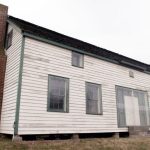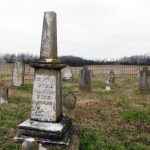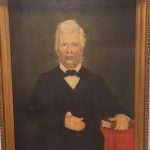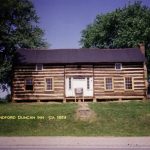PROGRESS: Grounds for history – famed Franklin dueling site connects past and present
Published 6:00 am Friday, March 28, 2025






FRANKLIN — Today, the land itself is unadorned and unassuming, with nothing on site to commemorate its colorful, sometimes bloody history.
Local authorities estimate the site of the Linkumpinch dueling ground to be on a field behind where the Franklin Drive-In formerly operated.
The site of a pair of notable duels in the early 19th century, the dueling grounds in Simpson County near the Tennessee border remain a point of curiosity for tourists and history buffs — to the point that local businesses continue to trade on its reputation, forged two centuries previously, and officials promote the grounds as part of the larger story of the founding of Simpson County.
Trending
“I think the curiosity about the dueling brings people here,” Simpson County Tourism executive director Amy Ellis said about what attracts people to the Sandford Duncan Inn, a log home covered in plank weatherboarding that dates back to around 1819. “It’s part of our history, and I’m glad people have held on to it.”
Duncan was a prominent farmer of his time who was instrumental in Simpson County’s establishment, also in 1819.
Duncan and his family opened their home to travelers along the well-trod path of what was known then as the Cumberland Trace, providing lodging and spirits.
Among the guests who used the inn as a stopover were gentlemen of means, who having felt their honor besmirched in some way, would typically travel north from Tennessee to settle their disputes with pistols.
“It was a convenient place,” said James Henry Snider, president and CEO of the Simpson County History Center. “A lot of times, (duelers) would stay at the inn and then they could get up the next morning and go across the street and down the road a little bit and fight their duel.”
Snider said the grounds were situated in something of a legal no-man’s land referred to as the Kentucky jog — which on maps of Kentucky’s southern border looks like a protrusion in which Kentucky dips briefly south into Tennessee before resuming its straight-line path.
Trending
Local authorities say a quirk of surveying of ambiguous origin in the 18th century led to the mapping of Kentucky’s southern border featuring the unusual triangular jut southward in Simpson County, but there was disagreement then about whether the land in the jog was under Kentucky’s or Tennessee’s jurisdiction.
Dueling parties whose disputes originated in Tennessee exploited this confusion by holding their duels in Linkumpinch — a name that in itself carries unknown origin, Snider said.
With duels outlawed in both states, the thinking went that fighting on the dueling grounds would enable both sides to evade arrest and prosecution.
The two most well-known duels there were fought within a year of one another.
In 1826, Sam Houston, then a U.S. representative from Tennessee, fought Gen. William A. White, also of Nashville, in a duel to resolve a complicated political dispute in which Houston assailed the character of a man considered for appointment for postmaster of Nashville.
Houston, who bedded down the night before at Sandford Duncan Inn, emerged from the duel unscathed, and critically wounded White, who recovered from his injuries.
A Kentucky grand jury indicted Houston, but Tennessee officials refused to arrest him or otherwise offer him up to the Kentucky courts, and Houston would go on to serve as governor of both Tennessee and Texas, the only person to be the chief executive of two states.
Two Tennessee attorneys, Calvin Smith and Robert Brank, opposed one another in a criminal trial concerning a hog theft, and that culminated in the pair squaring off at Linkumpinch in 1827, resulting in Smith killing Brank, and then later being indicted and disbarred.
U.S. President Andrew Jackson, never known to shy away from a fight, did visit the inn, but did not fight at Linkumpinch — the duel he fought (and won) in Kentucky in 1806 took place near Adairville.
The legacy of the dueling grounds is tied in with the history of the Duncan inn, which despite the encroachment brought on by the widening of U.S. 31-W, remains where it was originally sited.
Snider said an enclosed hallway bisects the interior of the inn, and one half of the building would have been set aside for guests to eat and drink, while the other half would have been made up for overnight visitors.
“It was not like your Holiday Inn where you’ve got a private room, you might have had four, five or six people sleeping on the floor or on cots and beds at the same time,” Snider said. “You didn’t have a lot of privacy, but it was better than sleeping outside.”
Certainly, the historical significance of the inn has not been lost on the community over the years.
The late Nancy Stone, a Franklin community leader and chamber of commerce director speaking in the Jan. 13, 1992, Daily News about plans in Simpson County to celebrate Kentucky’s bicentennial, said the inn was “the single most important building in our history.”
When Duncan died in 1854, he owned 593 acres of land, 11 enslaved workers, 25 hogs, more than a dozen total horses, mules and cows and stock in the L & N Railroad, according to documents at the Simpson County History Center.
He and his wife, Nancy Ann, who died in 1862, are buried in a small cemetery behind the house.
The home passed through a number of private owners over the years until the early 1990s, when it was acquired by the Simpson County Historic Properties Trust with an aim toward restoring it.
The trust secured grant funding that helped pay for structural improvements in 1992, and the county received a $300,000 grant in 2000 from the Kentucky Department of Transportation toward further restoration efforts.
Beginning in 2010, the inn, now owned by the county and maintained by Simpson County Tourism, was available for tours by appointment only, and regularly scheduled tours began to be offered three days a week in 2019.
This decade, though, has witnessed more concerted efforts to promote its place in history.
Ellis became the county’s tourism director in 2020, when the COVID-19 pandemic put a halt to most activities related to tourism.
Within a year, though, Ellis teamed up with Nicky Hughes, a Franklin native who had returned home after a career in Frankfort, first with the Kentucky Historical Society and then with the city of Frankfort as a curator of historic sites.
Hughes, who now works as the innkeeper, curator and self-described “surviving duelist” when he takes part in re-enactments of the notorious gun battles, describes the start of his work at the inn as a bit of serendipity.
“I heard there wasn’t much going on right here, so I just walked into (Ellis’) office one day and said, ‘can I play with that’ and she literally handed me the keys,” Hughes said.
Hughes went to work drafting a plan to bring the inn and Linkumpinch back to life and make it a roadside attraction brimming with history.
The interior of the cabin is furnished in a way that is meant to conjure visions of how it may have looked in the mid-19th century.
“(Duncan) was very smart to open the house as an inn because even in the 1820s what we now know as 31-W was one of the busiest roads in the country,” Hughes said. “It is a log house, but it’s not your frontier log cabin. It’s furnished as a middle-class house in the 1850s to reflect a family that had been there from the time it was a frontier log house to the time it was a prosperous business location.”
More than a way station for dueling combatants, the inn historically offered a resting place for travelers along the busy Cumberland Trace.
One of those guests was Jenny Lind, a Swedish opera singer who embarked on a heavily promoted and critically acclaimed tour of the U.S. from 1850 to 1852.
Hughes said Lind stopped at the Sandford Duncan Inn between performances in Nashville and Louisville, and he hopes to incorporate that into future tours and re-enactments at the site.
The inn and the welcome center behind it are open five days a week now, with the property acting as the host to school groups and curious travelers.
Some summer functions have been held on the property to give visitors insight into what life in mid-19th century southern Kentucky may have been like.
“Nearly anybody local who comes by here, the first thing out of their mouth is ‘I’ve driven by this place my whole life and never knew what it was,’ so we’re fixing that,” Hughes said.
Ellis said the inn has been the site of some cross-promotion with Dueling Grounds Distillery, serving for a year as a tasting site for the Franklin distillery’s Linkumpinch Bourbon, while the distillery has paid for and provided signage for exhibits at the inn and raised awareness of the inn to distillery patrons.
Further ambitions involve, among other things, producing a video that would document the inn’s history, Ellis said.
“A dream would be able to put back some of the buildings that were on the property and have a full-time staff,” Ellis said.
Still, it’s the site’s strong ties to the field down the road where deadly fights for honor were waged that fascinate both locals and visitors.
Snider sees the curiosity in the amateur researchers who visit the museum.
“People look at the map closely and see it’s not a straight line between Kentucky and Tennessee and they wonder why, they want to know if there’s something special about the area, and when they find out they were dueling there, too, well that’s unusual and interesting,” Snider said.
And why wouldn’t they be curious? After all, local and state officeholders, to this day, take an oath of office in which they swear they have not taken part in a duel, even though the last formal duel in Kentucky took place in 1867.
Local businesses have leaned into that aspect of Simpson County’s history.
Kentucky Downs was known as Dueling Grounds Race Course when the thoroughbred racing track opened in 1990.
Though Kentucky Downs got its current name after new ownership purchased the track in 1997, riders there still run the Dueling Grounds Oaks, a race that carried a $1.6 million purse last year.
The distillery, established in 2013 by Marc Dottore, named its signature bourbon after the field where Sam Houston escaped both bodily harm and political ignominy.
Dottore opened the bar in 2016, and said he was drawn by the fact that the racetrack and a number of small businesses in Franklin over the years incorporated the dueling grounds into their name.
“When I had a chance to start the distillery and was workshopping names, that came to mind as a neat thing to try to revive and restore that sense of story and place to the area,” Dottore said. “The fact that we did that has helped shine a light on history that may have been lost and it’s felt good to do that.”
Dottore said he enjoys letting new distillery customers in on Franklin’s unique place in history and unlocking for them the origins of the name of his business.
“There are people who come up to our place from Nashville or who are tourists coming from up north who don’t really equate the fact that we were an outlaw, frontier area in the early 19th century,” Dottore said. “We try to take it back to that sense of time and help people to see that.”













